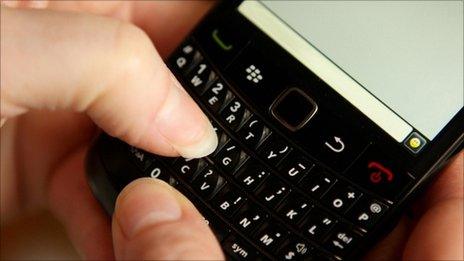Hawaii false alarm: How would UK handle missile threat?
- Published
People were warned to take shelter
Residents of Hawaii are reeling from the shock of a false ballistic missile alarm, after a government employee "pushed the wrong button". But how would UK citizens be made aware of an incoming strike?
Analysts agree a ballistic missile attack on the UK is highly unlikely. North Korea's nascent missile technology has nowhere near the range or reliability to hit European shores.
Nevertheless, Sweden is reportedly preparing hundreds of nuclear war shelters in case of a potential attack from Russia, while countries around the world have a range of advice for survival in such a scenario and many carry out drills.
In the event of such an attack being launched, would newsflashes be our only way of knowing? And with a few minutes' warning, what would British advice be?
As things stand, the UK doesn't appear to have a text message warning system in place specifically for this purpose.
The Cabinet Office announced in 2013 that a system to send emergency alerts to mobile phones within areas affected by flooding, industrial accidents or "other local risks" would be tested.
And in a government pilot, as many as 50,000 people received a message marked as a test. But mobile phone companies say nothing has been agreed yet.
A spokesman for EE told the BBC News website the UK government was "working with the mobile industry to put this capability in place".
And a source at another major UK mobile phone company said: "The government are looking at text alerts but not for anything potentially incoming from North Korea.
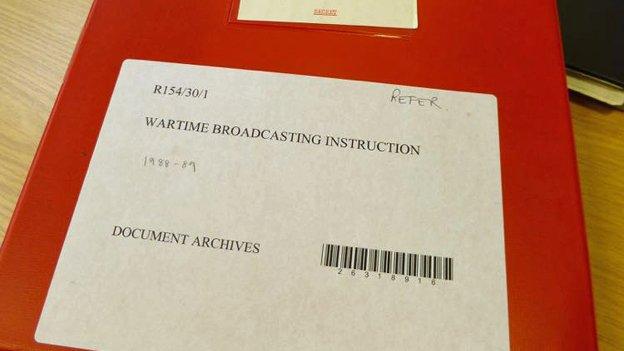
The "war book" detailing the BBC's previous plans for broadcasting while under nuclear attack
"The technology is there and it's relatively easy to do, but the government are considering it more in terms of floods."
The project is being overseen by the Cabinet Office's Civil Contingencies Secretariat. A spokesman said: "The UK has robust emergency management arrangements and is designed to be flexible, adaptable and applicable to a range of emergency scenarios.
"These include the capability to warn and inform the public through a range of channels including social and broadcast media platforms and direct alert such as the flood warning system. We continue to keep these arrangements under review."
But what else has Britain got?
Some World War II air raid sirens were retained during the Cold War to broadcast the chilling "four-minute warning" that never came.
But after the Berlin Wall fell, that network was dismantled.
Although the UK does have a few warning sirens left, they are largely found around chemical plants, oil refineries and flood areas.
'Falsetto'
That would leave old-fashioned news flashes as the primary warning - albeit hastened to the public consciousness by smart phones and social media.
In 2016, the BBC revealed the so-called "War Book" it drew up during the Cold War, containing detailed plans for broadcasting in the event of a nuclear strike.
The corporation would have operated from 11 bunkers across the UK, with studios manned by staff from local radio stations.
The codeword for authorising a national warning was "Falsetto". Peter Donaldson, the late Radio 4 newsreader, pre-recorded an announcement.
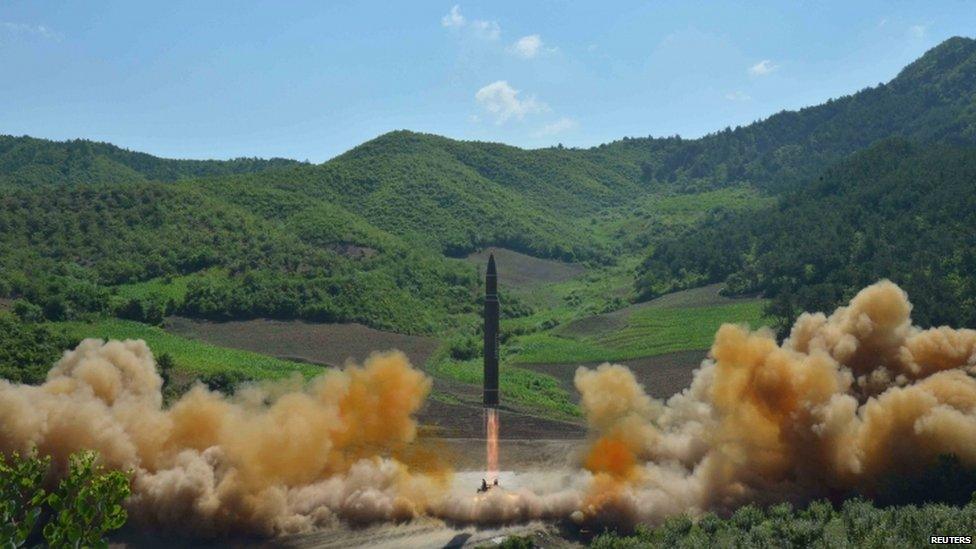
North Korea missiles are not thought to have the range to hit Britain (Image provided to Reuters by a North Korean news agency and could not be verified)
It began: "This is the Wartime Broadcasting Service. This country has been attacked with nuclear weapons.
"Communications have been severely disrupted, and the number of casualties and the extent of the damage are not yet known. We shall bring you further information as soon as possible.
"Meanwhile, stay tuned to this wavelength, stay calm and stay in your own homes."
Citizens were advised not to go outside "under any circumstances" as roofs and walls provided protection against radioactive fallout.
'BBC obliterated?'
They were told to turn off gas supplies and fill containers with water because the mains supply might not be available for long.
To conserve water, toilets were not to be flushed. It was advised that fresh food should be eaten before tinned food and it should also be rationed, as it might have to last 14 days or more.
The use of a well-known presenter for the message was considered crucial because an "unfamiliar voice" would lead listeners to conclude that "perhaps the BBC has been obliterated".
Current broadcasting arrangements in such a scenario are not public knowledge.
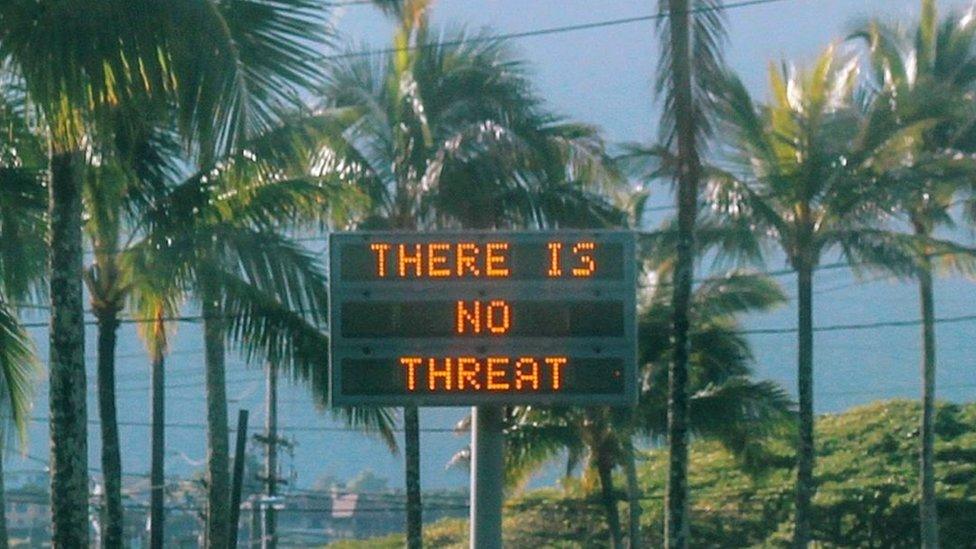
An electronic sign in Oahu after the false alarm
The Hawaiian alert was sent on Saturday morning by an emergency system worker. Residents spoke of hysteria and panicked evacuations.
There was no correction sent by text for 38 minutes, external, the Honolulu Star-Advertiser reported.
That was because the alert system did not allow for a correction to be sent quickly to mobiles - something the Cabinet Office might want to consider as it rolls out the UK's own capability.
Two people are also now required to sign off the issuing of an alert, Hawaiian authorities said.
- Published14 January 2018

- Published23 July 2016
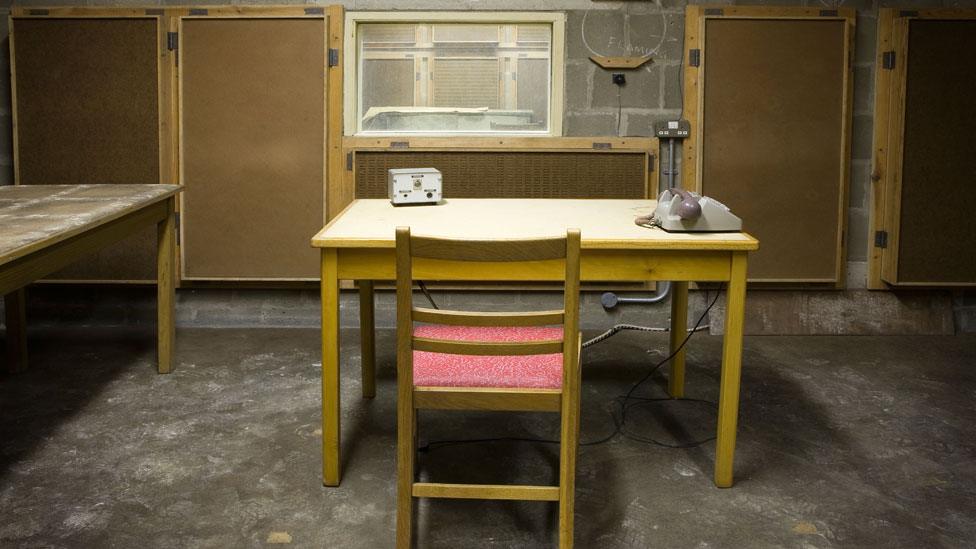
- Published17 September 2013
